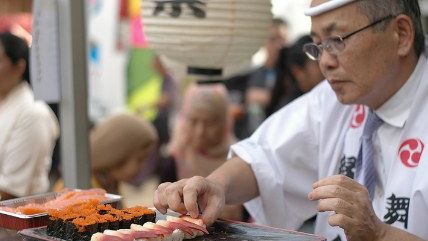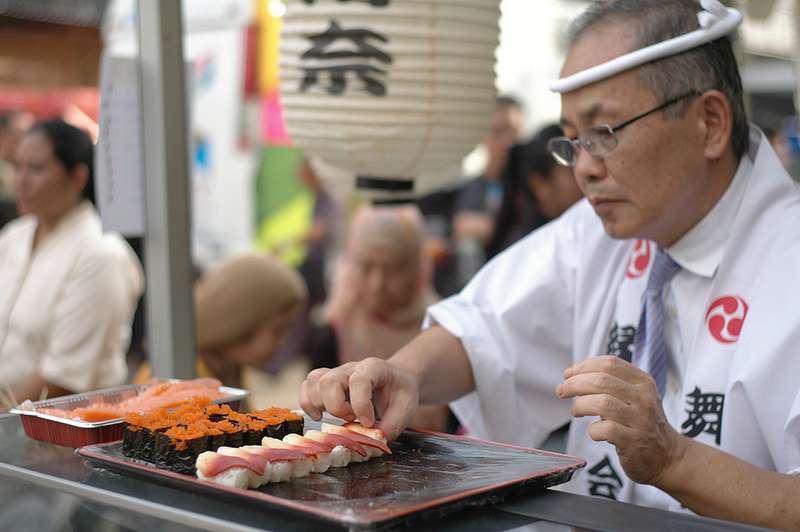The Gloves Are On in Fight Over Misguided New York Restaurant Rules
Requiring chefs to wear gloves doesn't make food safer and generates mountains of waste.


Last week, New York City health inspectors ordered the doors of celebrated Japanese restaurant Sushi Dojo closed.
The inspectors claim the restaurant's practice of allowing foodservice handlers to handle food is indefensible and dangerous.
Sushi Dojo chef David Bouhadana told Eater the glove regulation is garbage. "We were closed for one thing and one thing only, not wearing gloves," he writes. "Sushi chefs are not supposed to wear gloves. 17 employees lost their job because the DOH has been harassing me for four months and threatening me for this issue. I have 20+ of the best sushi chefs behind me and many more ready to bat for me. We will solve this BS rule, a rule I don't stand by. Sushi is being ruined [b]y gloves[.]"
The New York Post's Steve Cuozzo blasted the city health department, calling the crackdown on Bouhadana and the city's sushi chefs "stupid, arrogant and plain insane," in a column this week. Anthony Bourdain, the voice of high-end chefs in America, also took umbrage with the health department's stance.
Bouhadana told Grub Street that he'd paid out $6,000 in fines to the health department in recent months. "In most cases, the DOH only shuts restaurants down for major violations such as vermin infestations…. But the DOH had been to the restaurant six times previously citing them with violations for not wearing gloves. And this time, they lowered the boom: the restaurant had to close," reports Zagat.
Bouhadana, a Zagat award winner, has vowed to fight back against the health department.
If this controversy sounds familiar, that's because it is. In 2014, as I discussed here, California's state legislature passed a law barring foodservice staff—from sushi chefs making maki to bartenders zesting fruit into a cocktail—from touching ready-to-eat food with their hands.
At least 40 states still have similar laws on the books. Colorado, for example, doesn't require the use of gloves in restaurants. But the state prohibits chefs from touching food with their hands. The state, just like New York, suggests chefs use tongs, spatulas, or waxed paper instead.
Even though laws like these are on the books around the country, that doesn't mean they must be so. In fact, an inspirational, chef-led movement in California forced the state to repeal its law in 2014.
"This bill bothers me for many reasons," food entrepreneur Iso Rabins, who helped lead the movement to repeal the California law, told me last year. "For the aesthetic crime of not letting cooks touch their food (which I firmly believe makes good food almost impossible to make), for the environmental impact of using millions of gloves each day, and most importantly, that studies show glove use actually increases overall bacteria, which makes more people sick."
Rabins is right. A 2007 New York Times piece discussed a study suggesting the solution (gloves) may be making the problem (foodborne illness) worse. A 2012 Washington Post piece also cited research that made the same case.
So the rules don't make food safer. Clean hands, as the saying goes, are better than dirty gloves.
As Rabins also points out, rules like these also promote senseless food waste.
"Northern California especially is very concerned with sustainability," said chef Todd Davies, in comments to the Marin Independent Journal after the California law took effect. "Why would we want to create more trash in a society that creates way too much trash anyway?"
The California law, which passed unanimously, was repealed unanimously, with the law's original sponsor speaking out against it. Let's hope New York State—and dozens of others around the country—will soon follow suit.


Show Comments (31)